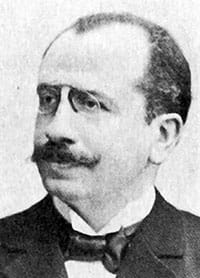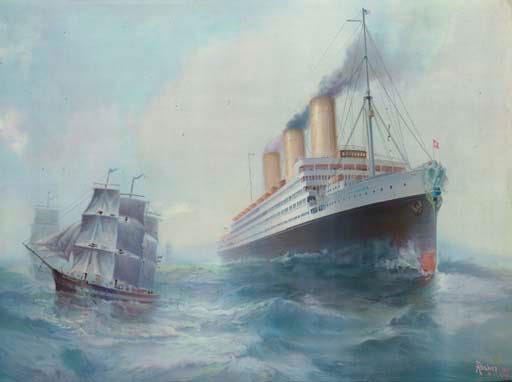A century ago, on July 24, 1914, German business leader Albert Ballin dined in London with Winston Churchill, first lord of the British admiralty. Ballin was general director of the Hamburg America Line, the world’s largest shipping concern. Theirs was the last face-to-face attempt to avert the outbreak of war between Germany and Britain, which occurred 11 days later.
World War I spelled the passing of widespread, unencumbered international borders.

Albert Ballin (1857-1918), general director of the Hamburg American Line, 1899-1918
In 1919, John Maynard Keynes evoked that prior globalizing epoch, describing how a prewar resident of London, while sipping morning tea, might order by telephone “products of the whole earth and reasonably expect their early delivery on his doorstep, adventure his wealth in natural resources and new enterprises … [anywhere, and] secure forthwith, if he wished it, cheap and comfortable means of transit to any country or climate without passport or other formality.”
Ballin was an architect of transportation mechanisms underpinning this international system. A core segment of early 20th century shipping was European migration to America. Migrant traffic was profitable but risky. High fixed costs of building and operating Titanic-era steamers were recouped from steerage revenues that could fluctuate severalfold in response to ups and downs of the U.S. labor market.
Shipping “passenger pools” were designed to help contain such risks. These cartels, masterminded by Ballin, specified market share for each member company. Firms with actual shares exceeding their quotas compensated companies in deficit. Enforcement was facilitated by U.S. immigration authorities’ reliable weekly tallies of steerage arrivals. Ellis Island handled three-quarters; the No. 4 destination, Philadelphia, saw 4 percent of traffic, which exceeded that of all smaller ports combined. The pool deals reduced the risk of ruinous fare wars and shifted corporate rivalry toward nonprice competition.
Ballin’s most significant counterparties in passenger pool negotiations were executives at British lines, but only later did Ballin realize how much the contemporaneous Anglo-German naval arms race was jeopardizing peace generally, and the future of commercial shipping in particular.
Introduced through business contacts, Ballin met Churchill in 1912. Their scope for negotiation was limited, however. By 1914, the naval race was slowing anyway but its damage had been done.

Winston Churchill (1874-1965), first lord of the Admiralty, 1911-1915
World War I is known for its illusions. The war ended the fiction that modern business interdependencies could halt major hostilities in their tracks, and it wasn’t long before it became clear that it was not a “war to end all wars.”
Ballin, international business negotiator par excellence but an amateur in international diplomacy, harbored his own illusions.
According to Ballin’s principal biographer, Churchill’s parting words to Ballin, spoken “almost with tears in his eyes,” were: “‘My dear friend, don’t let us go to war.’”
Churchill earnestly hoped that Germany might steer away from a collision course with Britain. Ballin’s optimistic interpretation was that Britain might steer away from a land war between Germany and her neighbors. In reality, by late July, it was already too late or very close to it.
The day before on July 23, Austria-Hungary had given Serbia an ultimatum, demanding an inquiry into the assassination of Austrian Archduke Franz Ferdinand and his wife and the elimination of Serbian terrorist groups—although Austria-Hungary was determined to reject whatever response came. France was already committed to defending Russia against Germany, and Germany to defending Austria against Russia by invading France via Belgium, bringing Britain in. The remaining undetermined link was whether Russia would back Serbia against Austria. Serbia’s near-acceptance of an unexpectedly extreme ultimatum, followed by Austria’s declaration of war on Serbia, led to Russian mobilization. Five days later war between Britain and Germany doomed hopes of a short conflict, effectively ending Ballin’s career and ushering in decades of nonpeaceful globalization.
Ballin later regretted not more forcefully opposing a German naval buildup threatening a vital interest of Britain without advancing one for Germany. Personal intervention of business leaders deciding war or peace seems strange today, perhaps more than it ought to.
Joseph Wharton’s “School of Finance and Economy” was founded to produce future “pillars of the state, whether in private or in public life.” Wharton alumni have served in many important public- sector posts, though few have entered international diplomacy. In a multipolar early 21st century bearing some similarities to the early 20th century, this may be a future project area with high rates of return.
Mutual noninterference is a reasonable default mode; politicians avoid meddling in business, business executives stay out of politics. Even in Wharton’s laissez-faire era, however, this was an oversimplified formula. Businesses can thrive in war as well as peace. Sustained commercial prosperity, however, is more likely under conditions of peace, stability, transparency and reliable playing fields with consistent rules. Business skills, strategic planning and risk management, have long-term relevance to public policy. The failures of 1914, helping generate what Ballin later called the “stupidest of all wars,” were failures of the political class not the business community, but there are historical lessons for all sectors in this summer’s centenary.

























